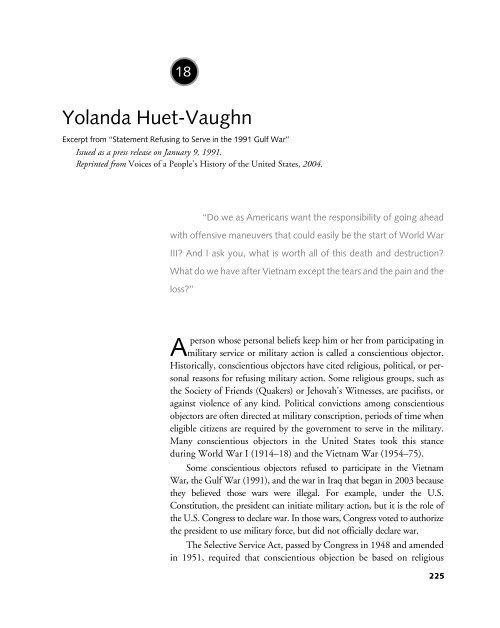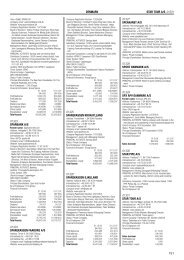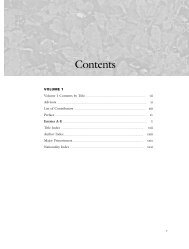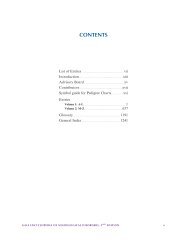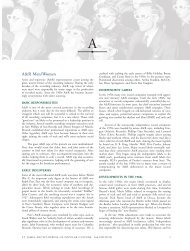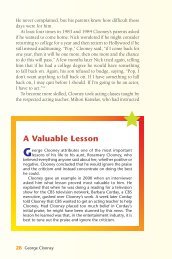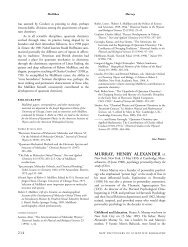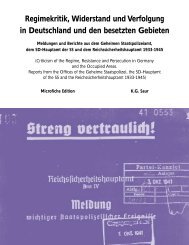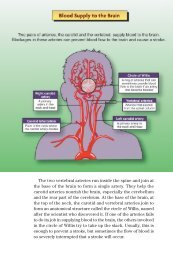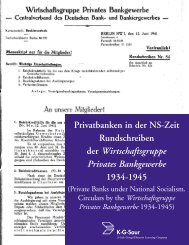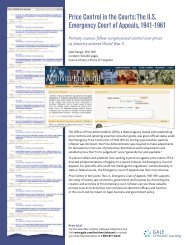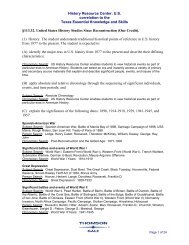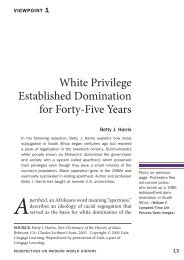Yolanda Huet-Vaughn - Gale
Yolanda Huet-Vaughn - Gale
Yolanda Huet-Vaughn - Gale
You also want an ePaper? Increase the reach of your titles
YUMPU automatically turns print PDFs into web optimized ePapers that Google loves.
18<br />
<strong>Yolanda</strong> <strong>Huet</strong>-<strong>Vaughn</strong><br />
Excerpt from ‘‘Statement Refusing to Serve in the 1991 Gulf War’’<br />
Issued as a press release on January 9, 1991.<br />
Reprinted from Voices of a People’s History of the United States, 2004.<br />
‘‘Do we as Americans want the responsibility of going ahead<br />
with offensive maneuvers that could easily be the start of World War<br />
III? And I ask you, what is worth all of this death and destruction?<br />
What do we have after Vietnam except the tears and the pain and the<br />
loss?’’<br />
A person<br />
whose personal beliefs keep him or her from participating in<br />
military service or military action is called a conscientious objector.<br />
Historically, conscientious objectors have cited religious, political, or personal<br />
reasons for refusing military action. Some religious groups, such as<br />
the Society of Friends (Quakers) or Jehovah’s Witnesses, are pacifists, or<br />
against violence of any kind. Political convictions among conscientious<br />
objectors are often directed at military conscription, periods of time when<br />
eligible citizens are required by the government to serve in the military.<br />
Many conscientious objectors in the United States took this stance<br />
during World War I (1914–18) and the Vietnam War (1954–75).<br />
Some conscientious objectors refused to participate in the Vietnam<br />
War, the Gulf War (1991), and the war in Iraq that began in 2003 because<br />
they believed those wars were illegal. For example, under the U.S.<br />
Constitution, the president can initiate military action, but it is the role of<br />
the U.S. Congress to declare war. In those wars, Congress voted to authorize<br />
the president to use military force, but did not officially declare war.<br />
The Selective Service Act, passed by Congress in 1948 and amended<br />
in 1951, required that conscientious objection be based on religious<br />
225
<strong>Yolanda</strong> <strong>Huet</strong>-<strong>Vaughn</strong><br />
U.S. soldiers stand near a destroyed SCUD missile, fired by the Iraqi military, during the Gulf War in 1991. More than 650,000<br />
U.S. troops participated in the war, and nearly 150 died in battle. CONSOLIDATED NEWS PICTURES/GETTY IMAGES.<br />
belief. In 1970 the U.S. Supreme Court removed the religious requirement<br />
and allowed objection based on a deeply held and describable set of<br />
moral values or ethics. A 1971 Supreme Court ruling added that one’s<br />
personal ethics must apply to war in general, and not simply to a specific<br />
war or military action.<br />
The lead up to the Gulf War was a tense period. Dr. <strong>Yolanda</strong> <strong>Huet</strong>-<br />
<strong>Vaughn</strong> became a conscientious objector for professional and political<br />
reasons. After having served in the military from 1977 to 1982,<br />
<strong>Huet</strong>-<strong>Vaughn</strong> enlisted in the U.S. Army Reserves as a medical reserve<br />
officer in 1989. Those serving in the reserves train in military operations,<br />
but live as civilians, or people outsidethemilitary.Whennecessary,<br />
reserves can be called for service to help supplement the regular<br />
U.S. armed forces.<br />
After Iraq invaded Kuwait in 1990, Saudi Arabia, which borders both<br />
Iraq and the much smaller independent nation of Kuwait, agreed to allow<br />
226 American Social Reform Movements: Primary Sources
a base for troops, equipment, and medical support for nations that<br />
were working together to expel Iraq from Kuwait. The military activity<br />
was called Operation Desert Shield, and <strong>Huet</strong>-<strong>Vaughn</strong> was called to<br />
report to Saudi Arabia in December 1990. She officially announced her<br />
refusal to serve on January 9, 1991. Three weeks later, the Gulf War<br />
began.<br />
Things to remember while reading<br />
‘‘Statement Refusing to Serve in the 1991<br />
Gulf War’’:<br />
<strong>Huet</strong>-<strong>Vaughn</strong> objects to Operation Desert Shield as ‘‘an immoral,<br />
inhumane, and unconstitutional act.’’ She gives several reasons:<br />
1) She believes the military action violates the Constitution; 2) she<br />
maintains that the medical oath she took when becoming a<br />
physician is to preserve life and prevent disease; and 3) she believes<br />
that as a human she needs to protect the planet. By participating in<br />
Operation Desert Shield, she would be violating both of those<br />
beliefs. She cites potential dangers to civilians and the environment<br />
to back her position.<br />
During the Gulf War, there was great concern around the world<br />
that Iraq possessed and would use chemical, biological, or nuclear<br />
weapons. <strong>Huet</strong>-<strong>Vaughn</strong> emphasizes that this would result in a<br />
medical disaster.<br />
Those who supported <strong>Huet</strong>-<strong>Vaughn</strong>’s refusal to serve in the Gulf<br />
War argued that the Nuremberg Charter (1950) applied to her<br />
case. The Nuremberg Charter is an international agreement that<br />
defines the principles under which an individual can be tried for<br />
war crimes, or crimes against humanity. The charter stemmed from<br />
the Nuremberg Trials following World War II (1939–45) in which<br />
Nazis accused of committing atrocities such as genocide—the<br />
intentional harming and killing of a particular group of people—<br />
were put on trial. Under Principle IV of the Nuremberg Charter, a<br />
military person has an obligation to not obey illegal orders.<br />
Similarly, American military manuals state that U.S. soldiers are<br />
under no obligation to involve themselves in criminal activities. As<br />
<strong>Huet</strong>-<strong>Vaughn</strong> notes, war plans against Iraq were likely to include<br />
the bombing of Iraqi cities. The bombing raids would likely result<br />
in civilian deaths (she notes that 57 percent of people in Iraq and<br />
<strong>Yolanda</strong> <strong>Huet</strong>-<strong>Vaughn</strong><br />
American Social Reform Movements: Primary Sources 227
<strong>Yolanda</strong> <strong>Huet</strong>-<strong>Vaughn</strong><br />
Questioning the War in Iraq<br />
Tim Predmore was on active duty with the 101st<br />
Airborne Division near Mosul, Iraq, during the war<br />
in Iraq that began in March 2003. In May of that<br />
year, President George W. Bush announced that<br />
major combat operations had ended. The speech<br />
was delivered beneath a sign that read ‘‘Mission<br />
Accomplished.’’<br />
In August of 2003, American troops continued to<br />
face hostile fire. Predmore felt compelled to write a<br />
letter to his hometown newspaper, the Peoria<br />
Journal Star, to question the ongoing war and why<br />
it was started. On August 24, 2003, the newspaper<br />
printed Predmore’s piece under the title ‘‘Death<br />
Here without Reason or Justification.’’ The essay<br />
was reprinted in the Los Angeles Times on<br />
September 17, 2003, and on many Web sites.<br />
The letter inspired many activists’ antiwar<br />
sentiments and protests. Predmore soon received an<br />
honorable discharge from the military and returned<br />
home. In his letter, Predmore observed: ‘‘This looks<br />
like a modern-day crusade not to free an oppressed<br />
people or to rid the world of a demonic dictator<br />
relentless in his pursuit of conquest and domination<br />
but a crusade to control another nation’s natural<br />
resources. At least for us here, oil seems to be the<br />
reason for our presence.’’ He added: ‘‘There is only<br />
onetruth,anditisthatAmericansaredying....<br />
How many more must die?’’<br />
Kuwait live in cities). Planned bombing raids that kill civilians are a<br />
crime under the Nuremberg Charter. Therefore, argued <strong>Huet</strong>-<br />
<strong>Vaughn</strong>’s supporters, her refusal to serve was covered by Principle<br />
IV, which reads: ‘‘The fact that a person acted pursuant to order<br />
[under orders] of his Government or of a superior does not relieve<br />
him from responsibility under international law, provided a moral<br />
choice was in fact possible to him.’’<br />
‘‘Statement Refusing to Serve in the 1991 Gulf<br />
War’’<br />
I, <strong>Yolanda</strong> <strong>Huet</strong>-<strong>Vaughn</strong>, M.D., am a board-certified family physician, a wife,<br />
a mother of three children ages two, five, and eight. I am also a member since<br />
1980 of Physicians for Social Responsibility, the U.S. affiliate of the<br />
International Physicians for the Prevention of Nuclear War. In 1982 I<br />
cofounded the Greater Kansas City Chapter of Physicians for Social<br />
Responsibility. I am from Kansas City, Kansas. I am a captain in the U.S.<br />
Army Reserve Medical Corps. In connection with the Gulf crisis I was called to<br />
active duty service in December 1990.<br />
228 American Social Reform Movements: Primary Sources
I am refusing orders to be an accomplice in what I consider an<br />
immoral, inhumane, and unconstitutional act, namely an offensive<br />
military mobilization in the Middle East. My oath as a citizen-soldier to<br />
defend the Constitution, my oath as a physician to preserve life and<br />
prevent disease, and my responsibility as a human being to the<br />
preservation of this planet, would be violated if I cooperate with<br />
Operation Desert Shield.<br />
I had hoped that we as a people had learned the lessons of Vietnam<br />
[1954–75]—50,000 Americans dead—hundreds of thousands of civilian<br />
dead—and environmental disaster. What we face in the Middle East is<br />
death and destruction on a grander scale. Whereas in Vietnam we had 200<br />
<strong>Yolanda</strong> <strong>Huet</strong>-<strong>Vaughn</strong><br />
An antiwar protester dresses up<br />
like Uncle Sam during a<br />
demonstration in Washington,<br />
D.C., in 1991. The activists are<br />
urging the government to end<br />
what they consider to be an<br />
unjust war. AP IMAGES.<br />
Accomplice: An active participant<br />
in illegal activity.<br />
Military mobilization:<br />
Gathering of troops and<br />
military equipment.<br />
American Social Reform Movements: Primary Sources 229


